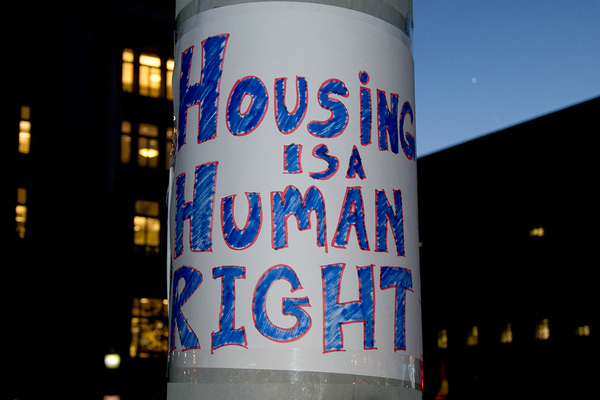In addition, the massive economic slowdown and the widespread job losses are expected to lead to a cascade of rental arrears and mortgage defaults during 2020, in the United States and internationally. This situation could become even worse if proactive policy measures and financial assistance are not forthcoming to help those who cannot meet their monthly payments. Widespread evictions of renters and defaulters or utility cut-offs could occur, which would cause further economic and social devastation. Evictions could lead to increased homelessness, making it even more difficult to contain a potential second or third wave of the pandemic before a vaccine is available.
Both of these threats — the lack of a safe and adequate home as well as the precarious existence of renters and mortgage defaulters in the face of eviction or foreclosure threats — are not new. Before the outbreak of covid-19, there was a pandemic of evictions around the United States, and the displacement of poorer communities was becoming all too common. The homeless population was already on the rise; tent cities were popping up on the West Coast. The real estate industry, led by private equity firms, caused the widespread displacement of renters even as the firms emerged as absentee landlords.
The covid-19 crisis has lifted the veil on these realities. Even the world’s wealthy countries find themselves confronting the housing dimensions of the covid-19 crisis with an urgency rarely acknowledged before. Now, they are adopting measures which were unthinkable in the pre-pandemic days: moratoriums on evictions, rent caps, relief for mortgage defaulters and assistance to homeless populations. The pressure on renters has already led to many tenant-protection measures. In the United States, state and local governments have adopted a series of protections for renters and mortgage defaulters and moratoria on evictions have been widely adopted by local or state governments. Some U.S. courts have also issued orders to provide temporary postponement of eviction proceedings.
These measures to respond to the housing crisis are welcome. They show that housing can be treated as a right, not just as a commodity, if there is a political will. In the United States, it has been historically difficult to argue for housing as a human right. But there has never been a better time to do that than now, when the urgency of the need for secure housing is so obvious.
Despite these welcome interim measures, legal and financial measures on the national level are necessary to secure housing as a right and to overcome the structural barriers to secure housing that exist from the pre-pandemic days. The emergency protections adopted around the United States for renters should ideally evolve into a national legislation that protects renters’ rights.
Such rights should include rent caps and subsidies for individual or small landlords, and they should ensure that no one is paying more than 30 percent of their income towards housing. The rental and housing markets should be deeply regulated to constrain the role of private equity firms as landlords. Lawmaker should explore federal monetary interventions to bail out low-income tenants and landlords in exchange for tenant protection. The federal bailouts we have seen thus far do not seem to focus on low-income people. Without such structural reforms, low-income people will continue to face a housing crisis, leaving them at the mercy of wealthy individuals and private equity markets.
The covid-19 crisis has exposed the huge social fractures that existed before the pandemic, and nowhere is this more obvious than in housing. Too many people lack adequate and safe access to housing, and too many live in precarious conditions facing the threat of evictions and displacement. The temporary measures adopted so far to deal with the fallout from the covid-19 crisis are welcome steps in the right direction. Yet they do not go far enough to build a more just and equitable housing environment. We should do everything we can to reimagine the post-coronavirus world so that no one lacks access to housing.
Source: washingtonpost




